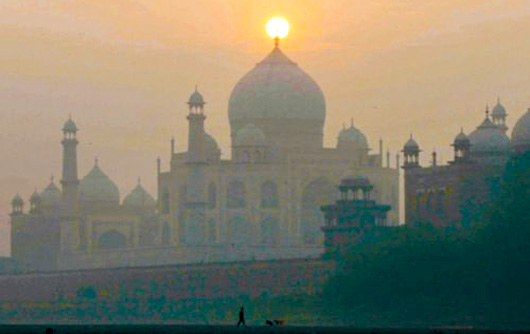Washington, Dec 11: A team of researchers from India and the US has found that the browning of the Taj Mahal's iconic marble dome and soaring minarets is due to dust and airborne carbon particles.
"Our team was able to show that the pollutants discolouring the Taj Mahal are particulate matter: carbon from burning biomass and refuse, fossil fuels, and dust - possibly from agriculture and road traffic," said Michael Bergin, professor at the Georgia Institute of Technology in the US.
Attracting millions of visitors each year, the Taj Mahal became a UNESCO World Heritage Site in 1983.
Beginning in the 1970s, observers noted a brownish cast to the white marble that makes up the structures.
For the study, the researchers used air sampling equipment to measure what was in the air in the Taj Mahal complex from November 2011 through June 2012.
In addition, they also placed small samples of pristine marble onto the Taj Mahal at various locations near the main dome.
After exposure to air pollutants over a two-month period, the researchers found particles of dust, brown organic carbon and black carbon in the filters and on the marble samples.
The carbon particles come from a variety of sources, including fuel combustion, cooking and brick-making, trash and refuse burning and vehicle exhaust.
The dust may come from local agricultural activities and vehicular traffic - or from distant sources.
Now that researchers know what's discolouring the Taj Mahal, the next step will be to identify the sources of the particles and plan control strategies.
The sources could be local - and the government has already taken steps to reduce vehicle and industrial emissions in the area - or the particles could be coming from longer distances away from the region, the authors pointed out.
"Some of these particles are really bad for human health, so cleaning up the Taj Mahal could have a huge health benefit for people in the entire region," Bergin concluded.
In addition to Georgia Institute of Technology and University of Wisconsin in the US, researchers from the Indian Institute of Technology at Kanpur (IIT-K) and Archaeological Survey of India (ASI) collaborated on the project. The study appeared in the journal Environmental Science & Technology.





Comments
Add new comment